Participants found that you can never be too prepared
The Association Forum of Chicagoland (AFC) was founded in 1916 to serve association professionals in the Chicago area. Chicagoland is the nation’s second-largest association community and is home to more than 1,700 associations. The area encompasses downtown Chicago, including the famous Loop and Michigan Avenue, and a menagerie of suburbs in a six-county area. The Forum provides association management education, information, and career services to the 4,000+ CEOs and staff professionals of the national, state, and local nonprofit groups that make up its membership.
“We put together programs that really target our membership,” said Thelma Dietsch, CAE, the Forum’s assistant director of learning experiences. “Attainium did a program for us a couple of years ago that was very well received, so we decided to bring back Bob (Mellinger, Attainium CEO) to present Attainium’s Disaster Experience™ for the disaster planning session.”
Aiysha Johnson, Forum’s assistant director for knowledge resources, said, “We hoped that organizations that didn’t have a plan or were working on one would bring a couple of the people heavily involved in the process. We had a very good turnout and the evaluations we got back indicated people would have liked an even longer session.”
“The session challenged us to think outside the bad weather or fire disruptions… it really brought to light the full scope of issues that could arise,” said Sandra Royer, senior director of brand management and communications for the Girl Scouts - Illinois Crossroads Council. “The tabletop offered experiential learning instead of just listening, and the dynamics of having a group of strangers working on a team was insightful. It became clear that you couldn’t reach consensus in crisis mode if you don’t have a plan – and someone as a leader – in place.
“The Girl Scouts organization is adamant about safety and security, and I found the session so worthy and valuable that I proposed to senior management that we bring people to the next session,” Royer said. “I came away with some particularly helpful concepts, the first being that you really need to have both a response team and a crisis management team in place to deal with disruptions. The second was that the issues surrounding a shelter-in-place situation can be quite tricky and you need to think through how you would handle having the building sequestered for any amount of time.”
Srinivasan Varadarajan, Esq., Director, Dental Care Advocacy, at the Academy of General Dentistry, found that the Disaster Experience exceeded his expectations. “I really enjoyed the creativity and diversity of the scenario and the fact that it covered communication and other areas. Also, my eyes were opened as to the importance of building a plan with roles specifically assigned and of testing the plan; otherwise, you don’t know if it’s a good plan or whether the division of labor will work.”
“The evaluations we received made it clear that people found value in the fact that the session showed you could never be too prepared and most said, after going through the simulation, that they had more planning to do in specific areas,” Johnson said. “All of the comments were very positive, and we’ve decided we’re bringing Bob back again to do a follow-on program.”
# # #

